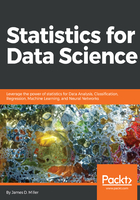
Transitioning to a data scientist
Let's start this section by taking a moment to state what I consider to be a few generally accepted facts about transitioning to a data scientist. We'll reaffirm these beliefs as we continue through this book:
- Academia: Data scientists are not all from one academic background. They are not all computer science or statistics/mathematics majors. They do not all possess an advanced degree (in fact, you can use statistics and data science with a bachelor's degree or even less).
- It's not magic-based: Data scientists can use machine learning and other accepted statistical methods to identify insights from data, not magic.
- They are not all tech or computer geeks: You don't need years of programming experience or expensive statistical software to be effective.
- You don't need to be experienced to get started. You can start today, right now. (Well, you already did when you bought this book!)
Okay, having made the previous declarations, let's also be realistic. As always, there is an entry-point for everything in life, and, to give credit where it is due, the more credentials you can acquire to begin out with, the better off you will most likely be. Nonetheless, (as we'll see later in this chapter), there is absolutely no valid reason why you cannot begin understanding, using, and being productive with data science and statistics immediately.
If you are seriously interested in not only understanding statistics and data science but eventually working as a full-time data scientist, you should consider the following common themes (you're likely to find in job postings for data scientists) as areas to focus on:
- Education: Common fields of study are Mathematics and Statistics, followed by Computer Science and Engineering (also Economics and Operations research). Once more, there is no strict requirement to have an advanced or even related degree. In addition, typically, the idea of a degree or an equivalent experience will also apply here.
- Technology: You will hear SAS and R (actually, you will hear quite a lot about R) as well as Python, Hadoop, and SQL mentioned as key or preferable for a data scientist to be comfortable with, but tools and technologies change all the time so, as mentioned several times throughout this chapter, data developers can begin to be productive as soon as they understand the objectives of data science and various statistical mythologies without having to learn a new tool or language.
- Data: The ability to understand data and deal with the challenges specific to the various types of data, such as unstructured, machine-generated, and big data (including organizing and structuring large datasets).
- Intellectual curiosity: I love this. This is perhaps well defined as a character trait that comes in handy (if not required) if you want to be a data scientist. This means that you have a continuing need to know more than the basics or want to go beyond the common knowledge about a topic (you don't need a degree on the wall for this!)
- Business acumen: To be a data developer or a data scientist you need a deep understanding of the industry you're working in, and you also need to know what business problems your organization needs to unravel. In terms of data science, being able to discern which problems are the most important to solve is critical in addition to identifying new ways the business should be leveraging its data.
- Communication skills: All companies look for individuals who can clearly and fluently translate their findings to a non-technical team, such as the marketing or sales departments. As a data scientist, one must be able to enable the business to make decisions by arming them with quantified insights in addition to understanding the needs of their non-technical colleagues to add value and be successful.